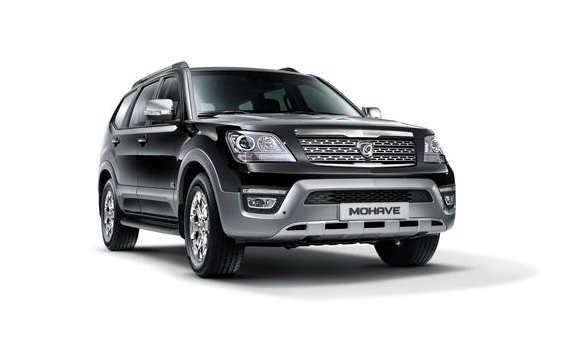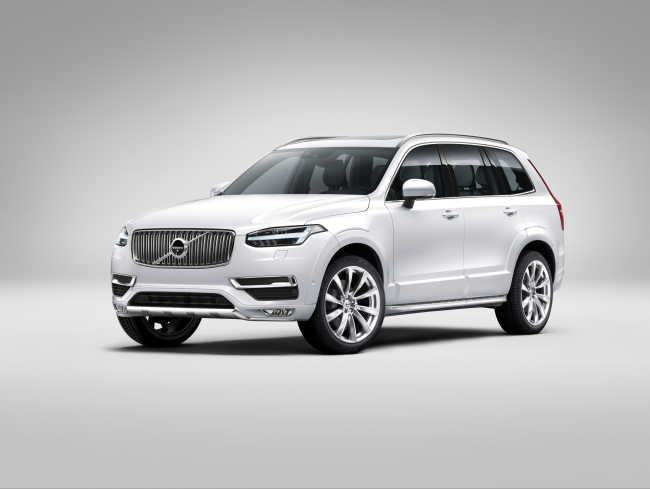Competition over full-size SUVs heating up
Falling oil prices and demand for leisure activities spur sales of large SUVs
By 서지연Published : March 6, 2016 - 18:22

Carmakers are rushing to roll out full-size, luxury sports utility vehicle as demand for bigger and broader SUVs is heating up, amid falling oil prices and the extension of tax benefits.

“As the craze for SUVs continues, carmakers -- domestic or foreign -- are in competition to debut full-size SUVs to strengthen their SUV product lineup and to raise profit margins,’’ said an official from the Korea Automobile Manufacturers Association.
SUV was one of the biggest buzzwords of the car industry last year. Industry sources estimated SUV sales by Korean and foreign carmakers grew 34.7 percent and 36.1 percent, respectively, last year from a year ago. The sources added that despite the economic slowdown, the growth momentum of SUVs will continue this year as a growing number of sedan owners consider a shift to SUVs.
The newest and latest trend in the segment is the rise of larger SUVs, backed by low oil prices and extended tax benefits to new car buyers until June, designed to boost consumption that is in a slump. Growing demand for a variety of leisure activities also fuel the zeal for better performing SUVs.
Among Korean carmakers, Kia Motors was one of the forerunners in the race for full-size SUV buyers, launching the face-lifted version of Mohave, its flagship off-road SUV, in February, eight years after the debut of the first generation in 2008.
Mohave came back with an upgraded design and stronger engine performance. Despite the cost increase caused by the replacement of the engine to meet stricter Euro 6 emissions regulations, Kia kept the price tag below 50 million won, targeting male car buyers in their 40s and 50s who are budget conscious but have a strong urge to own a macho vehicle.
Foreign carmakers are focusing on luxury large SUVs instead of sedans this year, developing attractive price strategies and a variety of options.
In February, Lexus, Toyota’s premium brand, launched the all-new RX 350h, its mid-size hybrid SUV, saying SUVs will lift its sales this year with hybrid sedans.
In the first week of March, Swedish luxury carmaker Volvo Car and German luxury carmaker Audi debuted their all-new flagship SUV-Volvo XC90 and Audi Q7 respectively.
Volvo Korea CEO Lee Yun-mo said the company set the starting price of its redesigned, seven-seat XC90 at 80.3 million won, lower than models of its German rivals to gain a bigger share in the fast-growing premium SUV market. In a first for imported car brands, the company is also offering the three trims of XC90 a five-year or 100,000 km warranty program.
Audi’s all-new, seven-seat Q7 SUV, launched here last Thursday, aims to attract luxury car buyers, armed with better design, fuel efficiency and powerful performance.
Another two German luxury carmakers BMW and Mercedes-Benz will also introduce full-size SUVs in the latter part of this year to bolster sales.
By Seo Jee-yeon (jyseo@heraldcorp.com)







![[Graphic News] More Koreans say they plan long-distance trips this year](http://res.heraldm.com/phpwas/restmb_idxmake.php?idx=644&simg=/content/image/2024/04/17/20240417050828_0.gif&u=)
![[KH Explains] Hyundai's full hybrid edge to pay off amid slow transition to pure EVs](http://res.heraldm.com/phpwas/restmb_idxmake.php?idx=644&simg=/content/image/2024/04/18/20240418050645_0.jpg&u=20240419100350)





![[From the Scene] Monks, Buddhists hail return of remains of Buddhas](http://res.heraldm.com/phpwas/restmb_idxmake.php?idx=652&simg=/content/image/2024/04/19/20240419050617_0.jpg&u=20240419175937)

![[KH Explains] Hyundai's full hybrid edge to pay off amid slow transition to pure EVs](http://res.heraldm.com/phpwas/restmb_idxmake.php?idx=652&simg=/content/image/2024/04/18/20240418050645_0.jpg&u=20240419100350)

![[Today’s K-pop] Illit drops debut single remix](http://res.heraldm.com/phpwas/restmb_idxmake.php?idx=642&simg=/content/image/2024/04/19/20240419050612_0.jpg&u=)